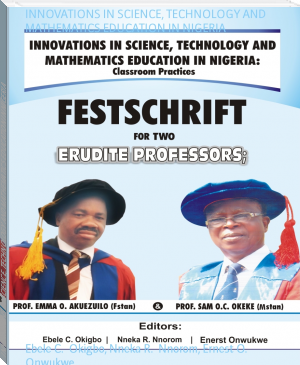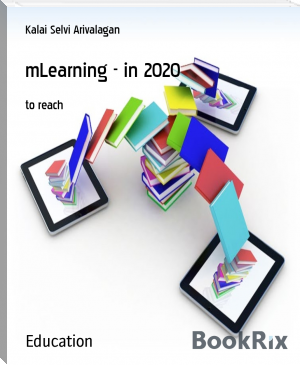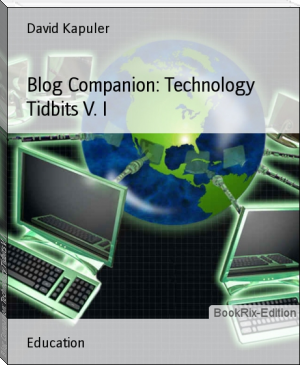INNOVATIONS IN SCIENCE, TECHNOLOGY AND MATHEMATICS EDUCATION IN NIGERIA - Ebele C. Okigbo, Nneka R. Nnorom, Ernest O. Onwukwe (best novel books to read TXT) 📗

- Author: Ebele C. Okigbo, Nneka R. Nnorom, Ernest O. Onwukwe
Book online «INNOVATIONS IN SCIENCE, TECHNOLOGY AND MATHEMATICS EDUCATION IN NIGERIA - Ebele C. Okigbo, Nneka R. Nnorom, Ernest O. Onwukwe (best novel books to read TXT) 📗». Author Ebele C. Okigbo, Nneka R. Nnorom, Ernest O. Onwukwe
Research Questions
The following research questions guided the study:
What are the problems encountered by secondary school biology teachers in the implementation of biology curriculum in secondary schools in Awka South local government Area?
To what extent do these problems affect effective teaching and learning of biology in Awka South local government Area?
What are the strategies for remedying the problems encountered by biology teachers in the implementation of biology curriculum in secondary schools in Awka South local government Area?
Method
This study was carried out in Awka South Local Government Area of Anambra State. The study adopted a descriptive survey design. Nworgu (2015) in line with Akuezuilo and Agu (2012) described survey research design as one in which a group of people or items is studied by collecting and analyzing data from only a few people or items considered to be representative of the entire group. The population for the study was made up of all the 48 biology teachers in all the eighteen government – owned secondary schools in Awka South local government Area of Anambra state. In view of the fact that the population is small and can be studied , the population was also used as sample size of the study. The instrument used in collection of data was a structured questionnaire, formulated around the research questions. The response modes are in 4 point modified rating scale of strongly Agree (4 point), Agreed (3 point), Strongly Disagreed (2 point) and Disagreed (1 point). The respondents were expected to indicate their extent of agreement or disagreement with the items.
The questionnaires were validated by two biology lectures from department of science education, Nnamdi Azikiwe University Awka, Anambra State. They did this by going through the items to ensure the clarity of expression and adequacy of the instrument for use in the study. The reliability of the instrument was determined using cronbach alpha and this yield a co-efficient of 0.80. The researchers administered the questionnaire personally to the 48 biology teachers in all the eighteen government – owned secondary schools in Awka South local government Area of Anambra state. The distribution and collection of the questionnaires was done in such a way that, the researchers gave the teachers enough time to fill them and confidentiality was assured. The copies of the questionnaires were collected after the completion on the same day. The responses were organized in tables according to the research questions and mean scores were used in analyzing the data. A mean of 2.50 was adopted as a decision rule for the analysis of the data collected. The criteria mean for considering the opinion of subjects positive or accepted was 2,50 or above, while any mean less than 2.50 was regarded to be negative or rejected.
Results
Research Question 1: What are the problems encountered by secondary school biology teachers in the implementation of biology curriculum in secondary schools in Awka South local government Area?
Table 1: The Mean teachers Responses on the Problems Encountered by Secondary School Biology Teachers in the Implementation of Biology Curriculum in Secondary Schools in Awka South Local Government Area.
S/N
Items Decryption
SA
A
SD
D
N
X
Decision
1.
Insufficient laboratory facilities
92
48
14
2
48
3.25
Agreed
2.
Lack of amount of equipment for experiments
160
18
4
-
48
3.79
Strongly Agreed
3
Lack of laboratory assistants and technologists
76
66
12
1,
48
3.23
Agreed
4
Inability of Teachers not going for in-service training
132
36
-
3
48
3.56
Strongly Agreed
5
Lack of quality of students textbooks
48
48
18
11
48
2.60
Agreed
6
Some students are not interested in practical classes
96
66
-
2
48
3.42
Agreed
Average Mean
3.31
Agreed
From the analysis of Table 1, it is observed that some of the problems encountered by secondary school biology teachers in the implementation of biology curriculum include insufficient laboratory facilities, lack of amount of equipment for experiments, lack of laboratory assistants and technologists, inability of teachers not going to students’ textbooks and some students not interested in practical classes. Average mean value of 3.31 implies that implementation of biology curriculum in secondary schools in Awka south local government area of anambra state is hampered by these factors.
Research Question 2: To what extent do these problems affect effective teaching and learning of biology in Awka South local government Area?
Table 2: The Mean of Teacher’s Responses on the Extent of Problems Affecting Effective Teaching and Learning of Biology in Awka South local government Area?
S/N
Items Decryption
SA
A
SD
D
N
X
Decision
1.
Discourages teachers from teaching
100
42
-
8
48
3.13
Agreed
2.
Makes learning and teaching difficult
124
36
4
3
48
3.48
Agreed
3
Affects academic achievement of students
132
39
-
2
48
3.60
Strongly Agreed
4
Makes teaching and learning boring to students
68
39
14
11
48
2.75
Agreed
Average Mean
3.24
Agreed
Data in Table 2 with average mean responses on the extent of problems affecting effective teaching and learning of biology is 3.24. This means that the problems that are countered by teachers in the implementation of biology curriculum significantly and agreed on by respondents to affect teaching and learning of biology.
Research Question 3: What are the strategies for remedying the problems encountered by biology teachers in the implementation of biology curriculum in secondary schools in Awka South local government Area?
Table 3: The Mean of Teachers Responses on Strategies for Remedying the Problems Encountered by Biology Teachers in the Implementation of Biology Curriculum in Secondary Schools in Awka South local government Area
S/N
Items Decryption
SA
A
SD
D
N
X
Decision
1.
Provision of laboratory facilities
148
30
-
1
48
3.73
Strongly Agreed
2.
Adequate equipment for experiments
108
63
-
-
48
3.56
Strongly Agreed
3
Provision of laboratory assistants and technologists
128
39
-
3
48
3.54
Strongly Agreed
4
Organization of In-service training and workshops
96
66
-
2
48
3.42
Agreed
5
Provision of standard teaching and learning materials
164
21
-
-
48
3.85
Strongly Agreed
6
Organization of biology practicals
88
63
-
5
48
3.25
Agreed
Average Mean
3.56
Strongly Agreed
Data in Table 3 with average mean responses on the strategies for remedying the problems encountered by biology teachers in the implementation biology curriculum in secondary schools is 3.56. This shows that the respondents strongly agreed that all the research items in Table 3 are possible strategies that could be adopted to improve the problems encountered by biology teachers in the implementation of biology curriculum in secondary schools system.
Discussion of Results
The findings from the study revealed that there are a lot of problems that are encountered by biology teachers in the implementation of biology curriculum in secondary schools. Some of these problems include: insufficient laboratory facilities, insufficient amount of equipment for experiments, lack of laboratory assistants and technologists not helping teachers in organizing and conducting practicals, inability of teachers not engaging in in-service training and workshops, lack of quality of students textbooks and some students not interested in practical classes among others. This findings agreed with the findings of Nwagbo and Ugwuanyi (2012) what in their study said that lack of teachers in-service training make them not quite competent to implement effectively biology curriculum.
The findings also indicated the problems as it affects meaningful teaching and learning of biology in secondary schools. It hampers academic achievement of students which is in line with the findings of Eze (2012) opined the challenge that face biology teachers in the course of implementing biology curriculum affect students’ academic achievement.
The findings from the study also revealed that this problems can be remedied that this problems can be remedied through the provision of laboratory facilities, adequate equipments for experiments provision of laboratory assistants and technologists, organization of in-service training and seminars, provision of standard teaching and learning materials and organization of biology practicals among others. This findings agree with the finding of Ezenduka and Achufusi (2016) who reported that training of pre and in-service biology teachers significantly help in the implementation of biology curriculum and improved students’ achievement in biology.
Conclusion
In conclusion, provision of laboratory facilities and standard teaching and learning resources are very important for the effective teaching and learning of Biology (Nwagbo, 2016). From the result gathered so far in this study, it was discovered that a lot of problems are encountered by teachers in the implementation of biology curriculum and these problems could be remedied by provision of laboratory facilities, organization of teachers in-service training and workshops, and organization of biology practicals among others for effective implementation of biology curriculum in senior secondary schools system. It is believed that if these goals are achieved, the teaching of biology will be more effective and students will find biology interesting as well as do better in their internal and external examinations both presently and in future.
Recommendations
Based on the findings of this study, the following recommendations and suggestions were made as regards to the problems encountered by biology teachers’ in the implementation of the senior secondary school biology curriculum in Awka South local government Area.
Government should provide teaching materials and any other relevant equipment needed for effective instruction in senior secondary schools biology curriculum.
Teachers should be regularly exposed through in-service training, seminars and workshops on the relevant scientific knowledge and manipulative skills to improvise and use available useful local materials for teaching biology concepts.
Government and curriculum policy makers should help to organize periodical visitation and supervision of teachers to assess the extent to which teaching materials are employed during teaching – learning process.
Government should make policies that can enable easy implementation of biology curriculum in secondary school system.
References
Akuezuilo, E.O. &Agu, N. (2012).Research and Statistics in Education and Social Sciences: Methods and Applications. Awka Nuel Centi Publishers and Academic Press Ltd.
Ali, A. (2015). Nigerian Secondary School Science Teachers’ Perception of Effective Implementation of Biology Curriculum. Journal of Research in Curriculum Studies, 1, 49-56.
Eze, G.N. (2012). The Challenges of the 21st century classroom. The relevance of ICT to UBE. Proceedings of the 53rd annual conference of science teachers association in Okechukwu Abonyi edition.278-283.
Ezenduka, C.U. & Achufusi, J.N. (2016). Challenges encountered by practicing pre-service teachers to effective utilization of IC resources in secondary school biology teaching. 57th annual conference proceedings of STAN. University of Nigeria press limited, 380-386.
Morris, P. (2017). The Hong Kong School Curriculum: Development, issues and policies. 2nd Ed. Hong Kong: Hong Kong University Press.
Nwagbo, C.R. (2016). Science, technology and mathematics (STM) curriculum development: Focus on problems and prospect of biology curriculum delivery. In N.A. Udogi (Ed), The 57th annual conference proceeding of STAN on science curriculum development University of Nigeria. press limited, 77-81.
Nwagbo, C.R. & Ugwuanyi, C.S. (2012).Challenges to effective utilization of ICT in teaching and learning of basic science and technology in secondary schools. Proceedings of 53rd annual conference of STAN 215 – 220.
Nworgu, B.G. (2015). Educational Research Basic Issues and Methodology. Nsukka: University of Nigeria press limited, 269 – 273.
Obia, E. (2013). A Case Study of High School Teachers’ Decision Making Models for planning and Teaching Science. Journal of Research in Science Teaching, 26(6), 467 -501.
STAN (2014).Biology for senior secondary school. Ibadan: HEBN Publisher.
CHALLENGES TO EFFECTIVE UTILISATION OF OUTDOOR EDUCATIONAL ACTIVITIES IN TEACHING BASIC SCIENCE AND TECHNOLOGY AND REMEDIAL STRATEGIES.
Victor I. Ukah
&
Anthonia N. Ngwu
Abstract
The outdoor educational activities in the basic science and technology curriculum are geared towards the attainment of the curriculum objectives. In order to have an optimal attainment of these objectives, effective utilisation of these outdoor educational activities in teaching is required. Unfortunately, teachers are faced with challenges which are hindrance to effective utilisation of these activities. This paper therefore examined the challenges to effective utilisation of outdoor educational activities in teaching basic science and technology in the primary schools. The paper also proffered some strategies required to stamp out the challenges.
Keywords: Effective utilisation, Outdoor educational activities
Introduction
Counties of the world are classified as develop and developing nations based on their scientific and technological development. This goes a long way in determining the socio-economic and political strength of these nations. Nigeria as a developing nation has made some stringent efforts to be among the developed nation. Some are them were the vision 2020 and National Economic Empowerment and Development Strategies (NEEDS) which is the domestication of the Millennium Development Goals (MDGs) in Nigeria which has given birth to Sustainable Development Goals (SDGs). For such development to take place, the education sector of the nation should not be downplayed. This is because education has remained an instrument of change and national development (Danmole, 2011). In Nigeria education is an instrument “par excellence” for effective





Comments (0)